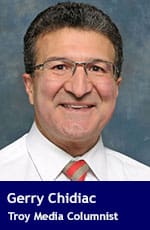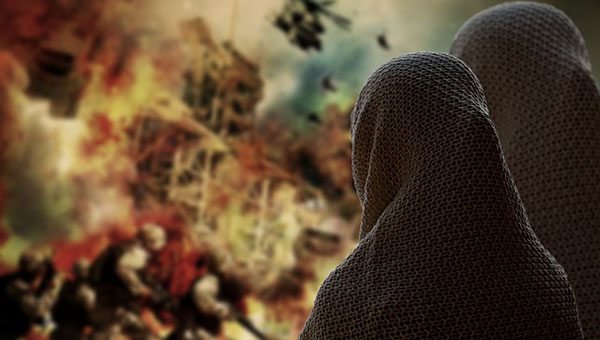Foreign agendas are fueling chaos in Syria and risking global stability

For interview requests, click here
It seems odd to many that just as a ceasefire came into effect in Lebanon, the civil war in neighbouring Syria flared up, with my grandparents’ city of Aleppo being the first stronghold to fall to Hayat Tahrir al-Sham (HTS). The group caught the government army off guard, and within days, Syrian President Bashar al-Assad fled the country.
The timing of this insurgence seems like a strange coincidence – until one begins to ask questions. Who is HTS? Who supports them? Why are their supporters taking this risk? And what are the potential consequences?
Mainstream media outlets, from CNN to Al Jazeera, portray HTS as a benign rebel group that liberated Syrians from Assad’s dictatorship. But it’s crucial to remember the organization’s roots. HTS evolved from Jabhat al-Nusra, an al-Qaeda affiliate in Syria, and its current leader, Abu Mohammed al-Golani, is still wanted by the CIA, which has placed a $10-million bounty on his head.
While some media celebrate Golani as a moderate force, history warns us of charismatic leaders who mask brutal agendas. This group, born from one of the most feared terrorist networks, raises serious questions about the narratives being pushed by global media.
 |
| Recommended |
| U.S. support for Israel mainly driven by geopolitical interests
|
| How tensions in the Middle East ripple across the globe
|
| Why is only Israel wrong when it defends itself?
|
The situation becomes even more complex when examining HTS’s alleged support network. Countries like Israel, Turkey, and the United States have been implicated in supporting various Syrian rebel groups, though their relationships with HTS remain murky. Turkey has reportedly backed Syrian factions to counter Kurdish forces, but its inconsistent approach to HTS raises questions about its actual goals. Turkish President Recep Tayyip Erdogan has often positioned himself as a champion of Palestine, but this rhetoric falls flat when considering that much of Israel’s oil flows through Turkey. Erdogan’s willingness to align with NATO intelligence while supporting certain rebel groups demonstrates a pragmatic, albeit risky, strategy. This gamble, however, appears to be backfiring. Turkey’s application to join the BRICS economic alliance has been sidelined, and Erdogan’s actions have eroded trust among allies and adversaries alike.
Russia’s influence in Syria cannot be overlooked. As Assad’s most powerful ally, Russia has provided crucial military support to his regime, including airstrikes and logistical assistance that have helped reclaim territories from groups like HTS. However, this intervention has come at a significant cost. Russian bombings have been accused of indiscriminate targeting, leading to widespread civilian casualties and the destruction of essential infrastructure. While Moscow frames its involvement as a fight against terrorism and a stabilizing force, its actions have deepened Syria’s humanitarian crisis and complicated efforts to broker a lasting peace. Russia’s strategic interests – securing its naval base at Tartus and reasserting its global power – underscore the dangerous game being played in Syria, where competing foreign agendas risk perpetuating the cycle of violence.
For the U.S., this is yet another chapter in a troubling history of backing armed groups to oust adversarial leaders, only to see those groups evolve into threats. Why should Golani and HTS prove any different from the Taliban? America’s continued reliance on such tactics raises serious questions about the coherence of its declared war on terror. Israel, too, is playing a dangerous game. Its destabilization of Lebanon’s government created the conditions for Hezbollah’s rise, and supporting rebel groups in Syria risks repeating the same mistakes, potentially creating new threats to Israel’s security.
The lack of clear answers from mainstream media compounds the confusion surrounding the current situation in Syria. Even state-funded outlets that offer pro-Palestinian perspectives fail to address critical questions about HTS’s rise and its implications. Fortunately, independent journalists like Aaron Maté provide a much-needed counterbalance. A Jewish Canadian working with independent, alternative media outlet The Grayzone, Maté has spent over a decade covering Syria with meticulous research. While his anti-imperialist stance may lean left, his reporting offers a rare combination of depth, honesty, and accuracy in an often misleading media landscape.
Ultimately, peace is the only viable solution to the violence engulfing Syria, Lebanon, Israel, and Palestine. Continued escalation serves no one, and with both the U.S. and Russia entangled in the region, the risks of broader conflict are enormous. The world cannot afford this gamble. As history shows, armed insurgencies often lead to chaos, and the civilian populations of all these nations bear the brunt of the violence.
If we seek truth, we will find the path to peace. Holding leaders accountable for the well-being of all people – not just their political interests – is the best way to secure that peace and, ultimately, our own safety. The Middle East has seen enough bloodshed. It’s time for the global community to focus on reconciliation and justice rather than perpetuating cycles of violence.
Only through truth and accountability can lasting peace be achieved.
Gerry Chidiac specializes in languages and genocide studies and works with at-risk students. He received an award from the Vancouver Holocaust Education Centre for excellence in teaching about the Holocaust.
Explore more on the Middle East, Syria, Terrorism
The views, opinions, and positions expressed by our columnists and contributors are solely their own and do not necessarily reflect those of our publication.
© Troy Media Troy Media is committed to empowering Canadian community news outlets by providing independent, insightful analysis and commentary. Our mission is to support local media in building an informed and engaged public by delivering reliable content that strengthens community connections, enriches national conversations, and helps Canadians learn from and understand each other better.
